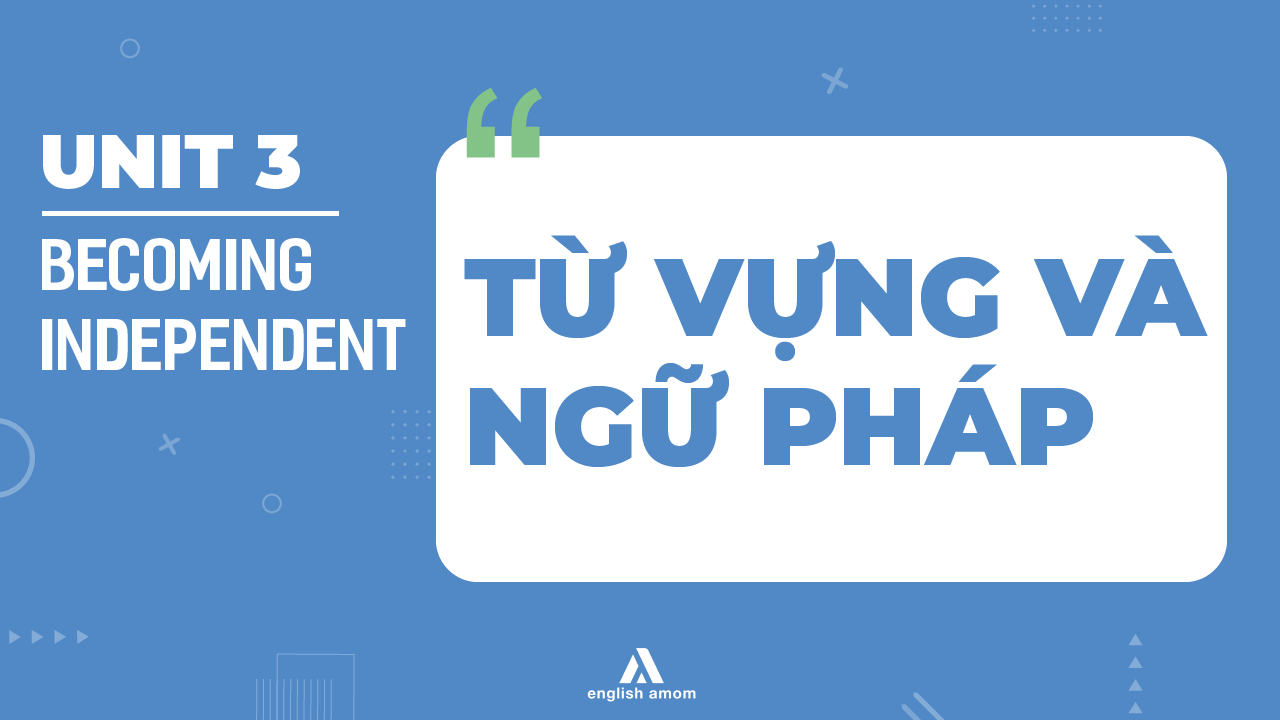
► Kênh hỏi đáp và giải thích thắc mắc kiến thức MIỄN PHÍ → truy cập LINK NHÓM: ENGLISH AMOM
► Kênh YOUTUBE hệ thống toàn bộ bài giảng CLIPS: truy cập LINK: ENGLISH AMOM CHANNEL
► Kênh TIKTOK: ENGLISH AMOM
1) Complete the following crossword puzzle.
.png)
ĐÁP ÁN:
ACROSS
1. reliable
2. decisive
3. well-informed
4. self-reliant
5. responsible
DOWN
6. independent
7. confident
2) Use the words from the crossword puzzle to complete the sentences.
1. He is respected for being .............................. about what is going on in the world.
2. He can be trusted to do the job well. He's a very .............................. person.
3. Our team needs a .............................. leader who can make important decisions quickly and confidently.
4. He is very .............................. And we can rely on him to complete the task efficiently.
5. If you want to be financially .............................., try to find a good job that pays well so that you do not have to rely on your parents.
6. All parents want their children to grow up independent and .............................. so that they don't have to depend on others for help.
7. To become .............................., you need to recognise your talents and good qualities.
ĐÁP ÁN:
| 1. well-informed | 2. reliable/responsible | 3. decisive | 4. reliable/responsible | 5. independent | 6. self-reliant | 7. confident |
3) Underline the mistakes in the following sentences and correct them.
1. Lan is always decisively. She can make decisions quickly.
2. My friend Jack is known for being very reliability. He can always be trusted.
3. You can't be independent on your parents all your life. It's time you got a job.
4. I'm very confidence that I'll pass the exams.
5. He always avoids taking responsible.
6. She used to be shy and lack confident in herself. Now, she's different: she believes in her ability to succeed in life.
7. Teenagers must show self-reliant so that they can be given challenging tasks.
8. ‘I'll climb the highest mountain, no one can stop me,’ he said very determined.
ĐÁP ÁN:
1. Lan is always decisively. She can make decisions quickly. → decisive
2. My friend Jack is known for being very reliability. → He can always be trusted. reliable
3. You can't be independent on your parents all your life. It's time you got a job. → dependent
4. I'm very confidence that I'll pass the exams. → confident
5. He always avoids taking responsible. → responsibility
6. She used to be shy and lack confident in herself. Now, she's different: she believes in her ability to succeed in life. → confidence
7. Teenagers must show self-reliant so that they can be given challenging tasks. → self-reliance
8. ‘I'll climb the highest mountain, no one can stop me,’ he said very determined. → determinedly
4) Combine the sentences using the to-infinitive.
1. The students heard that the President would visit their school. They were excited.
2. Laura has been selected to represent her class at the May Festival. She is proud.
3. I'll win the race. I'm determined.
4. Mike will volunteer to help at the special school for children with disabilities. He's willing.
5. Don't try to make him change his mind. It's not easy.
6. You have to understand English culture to communicate with English people successfully. It's necessary.
7. We all like to talk to him. It's interesting.
8. Because of developments in medicine, a lot of people can live to 100. It's quite possible.
ĐÁP ÁN:
1. The students were excited to hear that the President would visit their school.
2. Laura is proud to be selected to represent her class at the May Festival.
3. I'm determined to win the race.
4. Mike is willing to volunteer to help at the special school for children with disabilities.
5. It's not easy to make him change his mind.
6. It's necessary for you to understand English culture to communicate with English people successfully.
7. It's interesting to talk to him.
8. Because of developments in medicine, it's quite possible for a lot of people to live to 100.
5) Rewrite the sentences, using the nouns in brackets and a fo-infinitive so that the new senten have the closest meaning to the given ones.
1. She can cook for herself and that makes her more independent, (ability)
2. We were very impressed when we saw that she tried very hard to overcome difficulties, (effort)
3. Her teachers like her because she is always willing to learn, (willingness)
4. She has always wanted to visit the UK and that has made her work harder at her English language s (wish)
5. I agreed with him when he suggested that we should take part in more outdoor activities, (suggestion)
6. The headmaster refused to allow us to go camping in the mountains, (permission)
7. She was very disappointed because her father couldn't attend the teacher-parent meeting, (failure)
ĐÁP ÁN:
1. Her ability to cook for herself makes her more independent.
2. We were very impressed by her effort to overcome difficulties.
3. Her teachers like her because of her willingness to learn.
4. Her wish to visit the UK made her work harder at her English language skills.
5. I agreed with his suggestion to take part in more outdoor activities.
6. The headmaster refused to give us permission to go camping in the mountains.
7. She was very disappointed because of her father's failure to attend the teacher-parent meeting.

